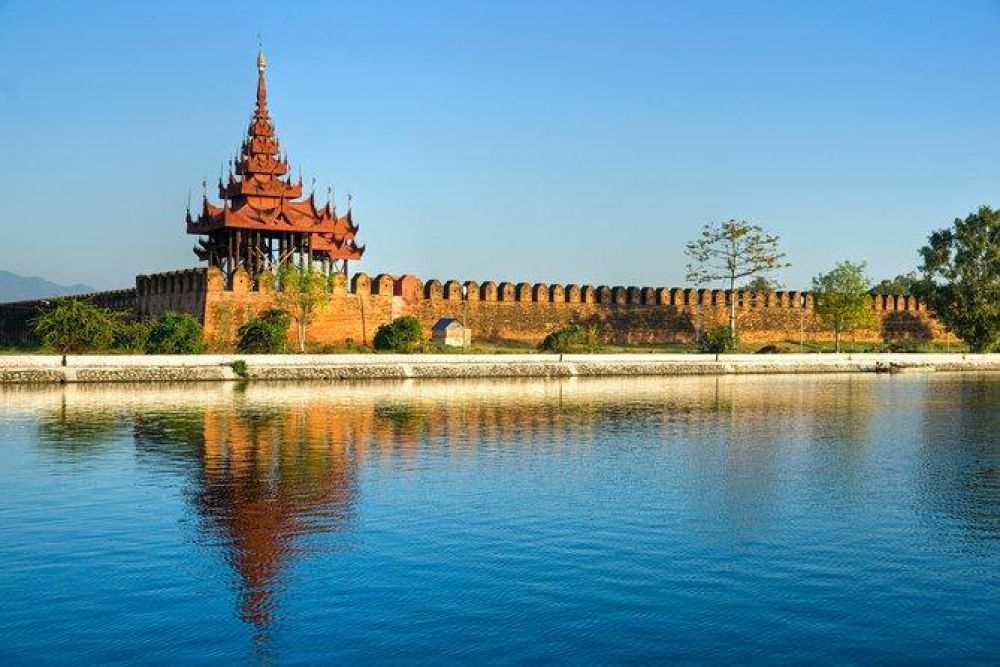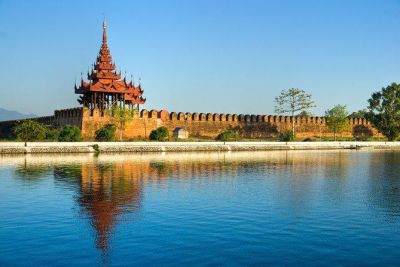

U Bein Bridge, located in Amarapura near Mandalay, is a picturesque teakwood structure and the oldest and longest of its kind in the world. The bridge spans across the Taungthaman Lake, measuring about 1.2 kilometers. A sunset stroll along the U Bein Bridge offers an unparalleled experience as the golden hues of the setting sun reflect on the calm waters. Visitors have the opportunity to observe local life, as the bridge is a vital crossing point for the local communities. You can see monks, locals on bicycles, and vendors selling snacks and trinkets. The iconic silhouette of the bridge against the vibrant skies makes for a picture-perfect moment, perfect for photography enthusiasts. This leisurely activity is best enjoyed in peace, and often, boat rides are available for those interested in capturing the sunset from a different perspective.
Mandalay Hill is a significant landmark offering panoramic views of Mandalay and the surrounding plains. The climb to the summit is a spiritual journey for many, passing several pagodas and monasteries along the way. The hill stands at 230 meters and is adorned with richly decorated shrines and pagodas, providing insight into Burmese culture and religion. Visitors can take the stairs or the escalators for a more comfortable ascent. Reaching the top, you're rewarded with breathtaking scenes, especially during sunrise or sunset. At the Sutaungpyei Pagoda, the hill's highest pagoda, you can admire the intricate glass mosaic work while soaking in the spiritual ambiance. Remember to dress respectfully, as the hill is a sacred site for the Burmese people.
The Mahamuni Buddha Temple is one of the most revered Buddhist sites in Mandalay and Myanmar as a whole. It houses the Mahamuni Buddha image, which is considered to be alive and therefore accumulates layers of gold leaves from devout followers. The image is over 2,000 years old and has a unique history, being brought to Mandalay from Mrauk U in 1784. The temple complex is bustling with activity, including local worship, market stalls, and religious ceremonies. Visitors can observe the daily ritual of face-washing the Buddha, which usually takes place early in the morning. The temple is an architectural marvel, and the ambiance is charged with devotion and serenity. Both the cultural significance and spiritual importance of the site make it a must-visit for anyone traveling to Mandalay.
The Mandalay Royal Palace is the last royal palace of the Burmese monarchy, constructed by King Mindon in the mid-19th century. Located at the heart of Mandalay, within a walled fort surrounded by a moat, the palace complex has been faithfully reconstructed to reflect its original grandeur after destruction during World War II. Visitors can explore the vast grounds, which include the Glass Palace (the main throne room), watchtowers, and the surrounding gardens. The palace provides deep insights into the Burmese royal history and offers a visual treat with its traditional architecture. The complex's tranquility and the views from the watchtower, overlooking the palace grounds and the city beyond, are highlights for visitors.
Kuthodaw Pagoda, known as the world's largest book, stands at the foot of Mandalay Hill. Built during the reign of King Mindon, the pagoda complex features 729 marble slabs engraved with Buddhist scriptures. Each slab is housed in its own stupa, arranged around the central golden pagoda. Visitors can walk through the aisles of white stupas, in a tranquil and introspective environment, learning about Theravada Buddhism and its teachings. The pagodas are an impressive sight, their uniformity and layout providing the backdrop for meditation and reflection. Photography enthusiasts will appreciate the symmetry and detail captured in the rows of stupas. This is more than a religious site; it is also a unique testament to Burmese culture and an important piece of history.
Immerse yourself in Burmese culture with an evening of traditional dance and puppet show. Mandalay is known for preserving the art of traditional puppetry, which portrays folklore, legends, and royal court scenes. Attending a show is not just a form of entertainment, but a way to connect with the local culture and history. Professionally trained puppeteers, accompanied by a classical orchestra, skillfully bring the puppets to life, demonstrating remarkable artistry. The shows often take place in cultural venues or local theaters, and while they are designed to be accessible to tourists, they retain an authentically Burmese spirit. Traditional dances are typically incorporated into the performance, featuring elaborate costumes and smooth choreography that captivates audiences.
Amarapura, the 'City of Immortality', is a former capital of Myanmar and a short trip from Mandalay. It is renowned for its traditional silk and cotton weaving industry. Visitors can tour various workshops to observe the intricate process of weaving and learn about the craftsmanship involved in creating beautiful textiles, often used in Burmese traditional dress. Touring these workshops not only provides insight into an artisanal craft but also allows visitors to support local businesses. The workshops often have showrooms where you can purchase handmade products – a perfect and unique souvenir from your travels. Alongside the weaving attractions, Amarapura is home to U Bein Bridge and other historical sites, making it a culture-rich destination.
Gold leaf production is an ancient craft that has been perfected over generations in Mandalay. At a Gold Leaf Workshop, visitors can witness the labor-intensive process of creating delicate sheets of gold, used in religious and traditional decoration. Observing artisans as they beat gold ingots into incredibly thin foil offers a unique glimpse into this traditional craft. The workshops demonstrate the patience and skill required, as the process can take many hours of meticulous work. Buying gold leaf to take home or donate at local temples can also be a meaningful way to be a part of the local religious practices. Visitors leave with a new appreciation for an art form that plays a significant role in Burmese culture.
The Mingun Pahtodawgyi is a monumental, unfinished stupa located in Mingun, approximately 11 km upstream from Mandalay. What would have been the world's largest stupa remains an impressive structure, despite its incomplete state due to an 1838 earthquake. King Bodawpaya began construction in 1790, intending to house a relic of the Buddha, but the project was never finished. Visitors can marvel at the massive cracks and the remaining infrastructure, highlighting the scale of the ambition behind the construction. The vast, semi-ruined temple complex has a unique aura and offers an evocative window into Myanmar's historical ambition and spiritual devotion. Nearby stands the Mingun Bell, which visitors can also see – once considered the largest ringing bell in the world.
Exploring the ancient city of Inwa (Ava) by bike offers an adventurous and eco-friendly way to experience this historical site. Once a royal capital, Inwa is now a rural countryside area, scattered with ruins, monasteries, and temples. Biking around Inwa allows you to travel at your own pace, stopping to visit landmarks such as Bagaya Monastery, built entirely of teak wood with intricate carvings, or the masonry Nanmyin Watchtower, known as the 'leaning tower of Inwa.' The peaceful landscape, dotted with remnants of ancient pagodas and the rural life of local farmers, makes the bike tour a serene and culturally enriching activity. Visitors can either join an organized bike tour or rent bicycles to explore the city independently.
